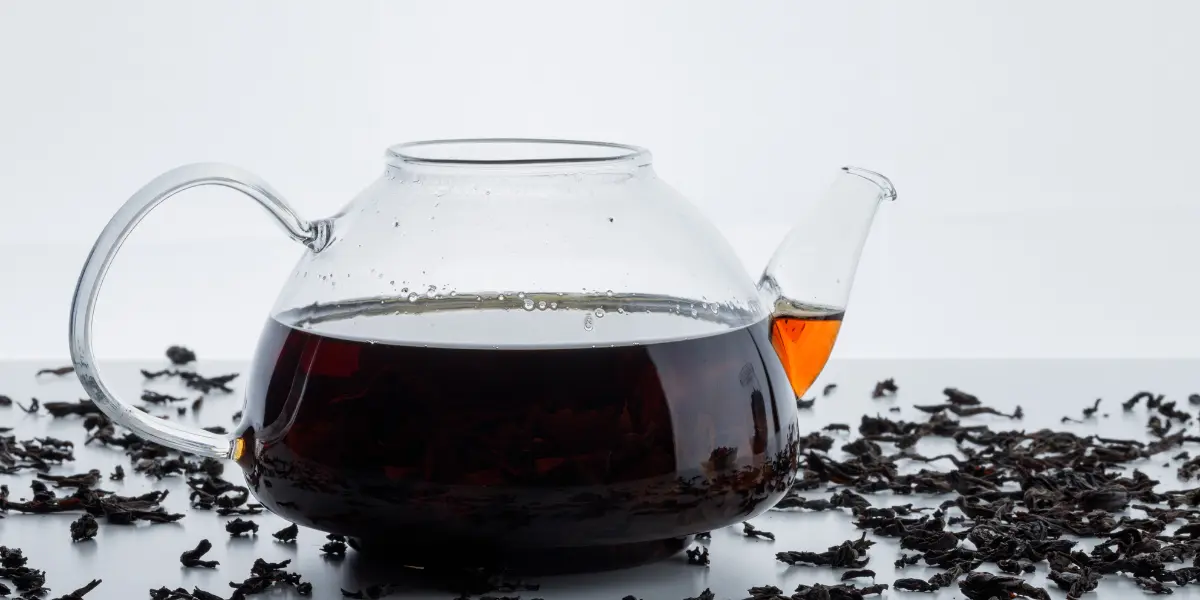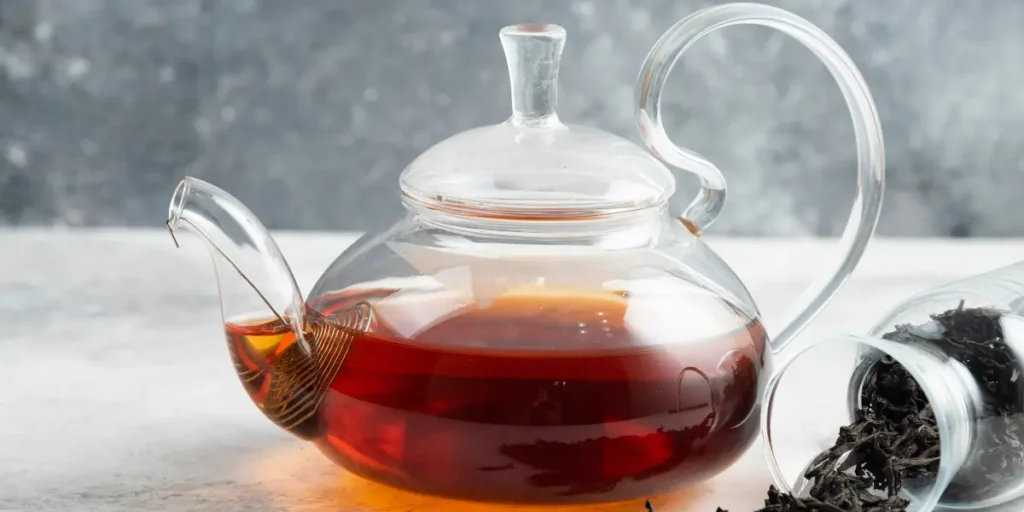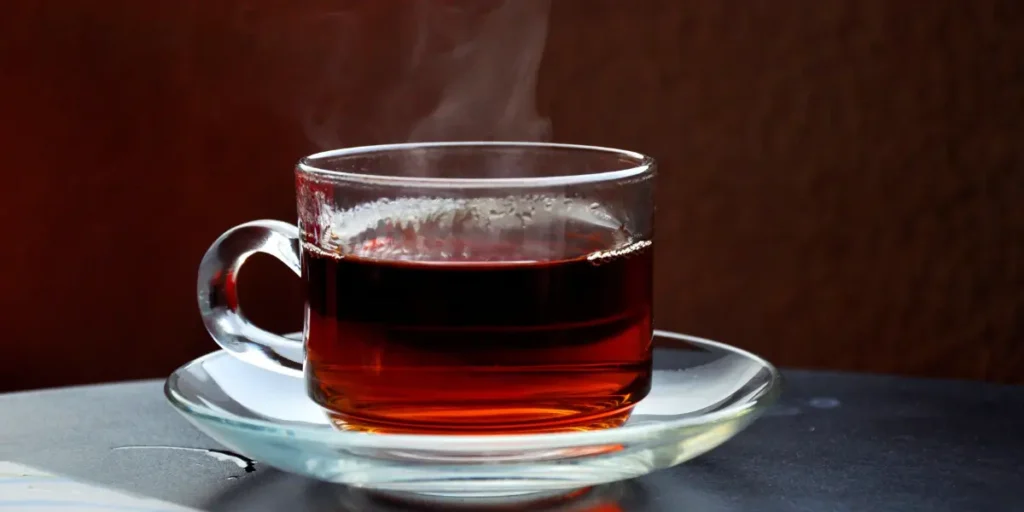The Ultimate Guide to Black Tea: Benefits, Types, and How to Brew It

Black tea is one of the most popular and widely consumed teas in the world, especially in the United States. Known for its bold flavor and rich history, black tea has become a staple in many American households—whether enjoyed as a morning energy boost, a refreshing iced tea on a hot day, or even as part of a traditional afternoon tea.
Beyond its taste, black tea is packed with health benefits, including antioxidants that support heart health and mental focus. Whether you’re a seasoned tea lover or just getting started, this guide will explore everything you need to know about black tea—from its origins and health benefits to the best ways to brew and enjoy it.
What is Black Tea?
Black tea is a fully oxidized tea made from the leaves of the Camellia sinensis plant. The oxidation process gives it its dark color, robust flavor, and higher caffeine content compared to green or white tea.
Unlike green tea, which is minimally processed to retain its fresh and grassy taste, black tea undergoes a full oxidation process. This chemical reaction enhances its depth of flavor, making it richer and more complex. Depending on the variety, black tea can have notes of malt, caramel, fruit, or even floral undertones.
Black Tea vs. Other Teas
Black tea stands out among other tea types due to:
- Higher caffeine content – More than green or white tea but less than coffee.
- Stronger flavor – Often bold, malty, or smoky.
- Longer shelf life – Due to its oxidation, it stays fresh longer than green or white tea.
Black tea has a rich history, originating in China and later becoming a key part of British and Indian tea culture. Today, it remains a favorite worldwide, with different regions producing unique varieties.
Health Benefits of Black Tea
Black tea is more than just a comforting beverage—it’s packed with health benefits that can support overall well-being. Thanks to its rich antioxidant content and natural compounds, black tea has been linked to several positive effects on the body.
1. Rich in Antioxidants
Black tea contains polyphenols, including catechins and theaflavins, which help fight oxidative stress and reduce cell damage. These antioxidants support immune health and may lower the risk of chronic diseases.
2. Boosts Heart Health
Studies suggest that drinking black tea regularly may reduce the risk of heart disease. The flavonoids in black tea can help lower blood pressure, improve cholesterol levels, and enhance overall cardiovascular health.
3. Improves Focus & Energy
Black tea contains a moderate amount of caffeine—less than coffee but enough to provide an energy boost. It also has L-theanine, an amino acid that promotes alertness without the jittery effects of coffee, making it a great option for sustained focus and concentration.
4. Supports Digestion & Gut Health
The polyphenols in black tea help promote healthy gut bacteria, aiding digestion and reducing inflammation in the digestive tract. Some research also suggests that black tea may help prevent the growth of harmful bacteria.
5. May Help with Weight Management
Some studies indicate that black tea can support weight management by improving metabolism and promoting fat oxidation. When consumed without added sugar or milk, it’s a low-calorie drink that can be a great alternative to sugary beverages.
6. Supports Immune Function
Black tea has antimicrobial properties that may strengthen the immune system. It can help the body fight infections and support overall health when consumed regularly.

Popular Types of Black Tea
Black tea comes in a variety of flavors and styles, depending on where it’s grown and how it’s processed. Here are some of the most popular types:
1. Assam (India)
- Known for its bold, malty, and full-bodied flavor.
- Often used in strong breakfast blends like English Breakfast.
- High caffeine content, making it a great morning tea.
2. Darjeeling (India)
- Often called the “Champagne of Teas” due to its light, floral, and muscatel notes.
- Typically enjoyed without milk to appreciate its delicate flavor.
- Best brewed at a lower temperature to avoid bitterness.
3. Earl Grey (Flavored Tea)
- A classic black tea infused with bergamot oil, giving it a citrusy aroma.
- Popular as both a hot tea and a base for London Fog lattes.
- Can be enjoyed plain or with a splash of milk.
4. English Breakfast (Blend)
- A strong, full-bodied blend made from Assam, Ceylon, and Kenyan teas.
- Often enjoyed with milk and sugar, making it a staple in Western breakfast routines.
- Known for its rich, comforting taste.
5. Lapsang Souchong (China)
- Unique smoky flavor due to the tea leaves being dried over pinewood fires.
- Often enjoyed by those who prefer bold and earthy teas.
- Pairs well with savory foods and whiskey.
6. Ceylon (Sri Lanka)
- Medium to full-bodied with a balance of citrus, spice, and chocolate notes.
- Great for both hot and iced tea.
- Commonly used in chai blends and flavored teas.
Each type of black tea offers a unique experience, so it’s worth experimenting to find your favorite!
How to Brew the Perfect Cup of Black Tea
Brewing black tea correctly ensures you get the best flavor without bitterness. Here’s a simple guide to making the perfect cup:
1. Choose Loose Leaf or Tea Bags
- Loose leaf tea provides a richer and more complex flavor.
- Tea bags are more convenient but may contain smaller tea particles, leading to a stronger, sometimes bitter taste.
2. Use the Right Water Temperature
- Black tea is best brewed with hot water between 195–205°F (90–96°C).
- Avoid boiling water (212°F/100°C) directly on the leaves, as it can make the tea taste too harsh.
3. Measure the Tea Properly
- Use 1 teaspoon of loose leaf tea per 8 oz (240 ml) of water.
- For stronger tea, add more leaves rather than increasing steeping time.
4. Steep for the Right Amount of Time
- 3–5 minutes is ideal for most black teas.
- A shorter time (3 minutes) results in a lighter, smoother taste.
- A longer time (5 minutes) gives a stronger, bolder flavor but may turn bitter.
5. Customize Your Tea
- Milk & Sugar: Common in English Breakfast and Assam teas.
- Lemon: Enhances citrusy teas like Earl Grey.
- Honey or Spices: Adds natural sweetness and depth to flavored teas.
6. Try It Iced!
- Brew double-strength black tea, then pour it over ice for a refreshing iced tea.
- Sweeten with honey or add fresh lemon slices for extra flavor.
By following these steps, you’ll always get a smooth, flavorful cup of black tea that suits your taste preferences.

Black Tea in American Culture
While traditionally associated with British and Asian cultures, black tea has carved out a significant place in American life. From the rise of iced tea to modern specialty blends, black tea continues to be a favorite among tea lovers in the U.S.
1. The Rise of Iced Tea
- Over 80% of the tea consumed in the U.S. is iced tea, with black tea being the most common base.
- Sweet tea, especially popular in the Southern states, is made by brewing strong black tea and sweetening it with sugar.
- Bottled and ready-to-drink iced tea brands, like Lipton and Arizona, dominate the market.
2. Black Tea in Coffee Culture
- Many Americans who prefer a lighter caffeine boost turn to black tea instead of coffee.
- Popular café drinks featuring black tea include Chai Lattes, London Fog (Earl Grey with steamed milk and vanilla), and Dirty Chai (chai tea with a shot of espresso).
3. Black Tea in Cocktails and Mixology
- Black tea is increasingly being used in cocktails and mocktails due to its bold flavor.
- Classic examples include Earl Grey-infused gin, black tea whiskey sours, and sweet tea vodka.
4. The Growth of Premium and Organic Tea Brands
- American consumers are becoming more interested in high-quality, organic, and loose-leaf black teas.
- Specialty brands like Harney & Sons, Teavana, and David’s Tea offer a wide range of artisanal black tea blends.
Black tea has evolved from a simple beverage to a versatile drink that fits various lifestyles, whether enjoyed hot, iced, or mixed into creative drinks.
Conclusion
Black tea is a timeless and versatile beverage that has won the hearts of tea lovers around the world, including in the United States. Whether you enjoy it hot or iced, plain or with milk, as a morning pick-me-up or a relaxing afternoon treat, there’s a black tea variety for every preference.
From its rich history and diverse flavors to its numerous health benefits, black tea offers much more than just a caffeine boost. With so many options available—Assam, Darjeeling, Earl Grey, and more—you can explore different types to find your perfect cup.
So why not take a moment to brew yourself a cup of black tea? Whether you’re looking to improve your health, experiment with new flavors, or simply enjoy a comforting drink, black tea is a delicious and rewarding choice.
Boost Your Tea Experience with Tea Burn
If you love black tea and want to enhance its benefits, consider trying Tea Burn—a natural, science-backed supplement designed to boost metabolism, support weight management, and increase energy levels.
What is Tea Burn?
Tea Burn is an easy-to-use powder that you can mix into your daily black tea (or any beverage). It’s formulated with:
✅ Metabolism-boosting ingredients to help burn fat naturally
✅ L-theanine and caffeine for sustained energy and focus
✅ Antioxidants to support overall health and digestion
Why Add Tea Burn to Your Black Tea?
✔ Enhances fat burning without changing your diet
✔ Boosts energy without jitters or crashes
✔ 100% tasteless – mixes seamlessly with your tea
Try Tea Burn Today!
Transform your daily cup of black tea into a powerful health-boosting drink. Get Tea Burn from the official website and start your journey today!
➡ Click here to visit the official Tea Burn website and order now!
Read Also: Detox Tea: 5 Powerful Options to Cleanse Your Body (and How to Make Them)
FAQ: Everything You Need to Know About Black Tea
Does black tea have more caffeine than coffee?
No, black tea has less caffeine than coffee but more than green or white tea. A typical cup of black tea contains 40–70 mg of caffeine, while coffee has 95–200 mg per cup.
Can I drink black tea every day?
Yes! Drinking black tea daily is generally safe and can provide antioxidants, heart health benefits, and improved focus. However, consuming too much caffeine (from any source) may lead to sleep issues or digestive discomfort in some people.
What’s the best way to sweeten black tea?
You can sweeten black tea with honey, sugar, agave, or stevia. If you prefer a natural flavor, try adding lemon or cinnamon for a slight sweetness without extra sugar.
Is black tea good for digestion?
Yes! The polyphenols in black tea can promote healthy gut bacteria, aiding digestion and reducing bloating. Some people also find that black tea helps with nausea or an upset stomach.
What’s the difference between English Breakfast and Earl Grey?
English Breakfast is a bold black tea blend, often made from Assam, Ceylon, and Kenyan teas, and pairs well with milk.
Earl Grey is a black tea flavored with bergamot oil, giving it a citrusy aroma and taste.
Can I drink black tea before bed?
Black tea contains caffeine, so it may not be the best choice before bedtime. If you’re sensitive to caffeine, try a decaf black tea or opt for an herbal tea like chamomile instead.
Is black tea good for weight loss?
Black tea is low in calories and may support weight management by boosting metabolism and reducing appetite. Just be mindful of added sugars in sweetened versions!
How should I store black tea?
To keep black tea fresh, store it in an airtight container, away from light, moisture, and strong odors. A cool, dark place like a pantry is ideal.

